|
|
|
Sort Order |
|
|
|
Items / Page
|
|
|
|
|
|
|
| Srl | Item |
| 1 |
ID:
108115
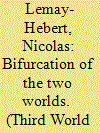

|
|
|
|
|
| Publication |
2011.
|
| Summary/Abstract |
Studies increasingly highlight the limits of state building conducted 'from the top-down'. Building on the literature and using a Rosenauian concept in a novel way, this article posits that international interventions create a 'bifurcation of the two worlds'. Departing from a study of Kosovo and Timor-Leste, the article posits that the massive arrival of staff involved in international governance will create a social gap between the international and the local 'worlds', which will in turn become a target of narratives of resistance by local actors. This bifurcation is exemplified by the 'white car syndrome', a concept representing the horde of white UN vehicles accompanying major interventions and developed in this contribution. Thus, the article attempts to shed new light on the legitimacy crises that Kosovo and Timor-Leste experienced at the beginning of the current century, while demonstrating and increasing the linkages between development studies and peace studies.
|
|
|
|
|
|
|
|
|
|
|
|
|
|
|
|
| 2 |
ID:
157532
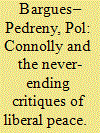

|
|
|
|
|
| Summary/Abstract |
Over the last decade, a dominant critique of international interventions underlines the problem that interventionary strategies have denied the political, societal and cultural heterogeneity of conflict-affected societies, excluding the interests of the majority of their population. A deeper engagement with the everyday life of these societies is understood to expose the errors of international missions and animate an alternative way of thinking about peace: ‘hybrid peace’, which is formed contextually and from below. Engaging with William Connolly’s work on pluralism, this article clarifies the nature of this critique, which rests securely on the assumption that local alterity cannot be fully understood, respected or treated sensitively by international governance approaches. However, as much as this assumption enables the thinking of an emancipatory hybrid peace, it is in turn the source of its critique, as hybrid peace is also seen as reproducing binary schemas and thus considered incapable of caring for the societies intervened in. At the conclusion, the metaphor of vorarephilia—paraphilia where sexual arousal occurs in the idea of being eaten or eating another person—will be used to warn against the tragic direction that critiques seem to be travelling to: critical scholars would be increasingly tempted to welcome the inevitable failures of international interventions.
|
|
|
|
|
|
|
|
|
|
|
|
|
|
|
|
| 3 |
ID:
186082
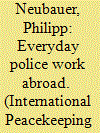

|
|
|
|
|
| Summary/Abstract |
Nowadays, police officers are regularly deployed as members of multilateral peace operations. This article examines how these experts implement their mandates and how we can understand their activities. For this, we draw on a set of 90 semi-structured interviews with European police experts who have experience in multilateral policing. We find that, to navigate their work abroad, European police officers primarily rely on their own domestic policing experience, their experience from previous deployments and the experience of colleagues they meet in the mission. The extent to which they can rely on their own experience is shaped by how much discretion they find at their disposal. We identify two conditions limiting their discretion: the preferences, policies and histories of host states, and institutional lock-in effects within missions that reduce officers’ room to manoeuvre over time. While we also find that officers do not normally draw on international guidance documents in their everyday work, missions can nevertheless be regarded as sites where more localized transnational policing practices emerge. These mission-specific transnational practices are formed, over time, by successive cohorts of police officers from different countries.
|
|
|
|
|
|
|
|
|
|
|
|
|
|
|
|
| 4 |
ID:
134784
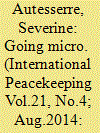

|
|
|
|
|
| Summary/Abstract |
In the past 15 years, scholars have started studying the local and micro-level dimensions of peacekeeping. They have investigated the nature and effectiveness of bottom-up peacebuilding, assessed the local versus national impacts of peacekeeping interventions and studied the decentralized actions of international peacebuilders on the ground. This commentary shows that, despite the approach's limitations, delving into these three topics opens up fruitful areas for further research, in particular analysing micro-to-macro linkages, evaluating peacekeeping's subnational impacts across cases, explaining peacebuilding successes and understanding the causes of peace itself.
|
|
|
|
|
|
|
|
|
|
|
|
|
|
|
|
| 5 |
ID:
159964


|
|
|
|
|
| Summary/Abstract |
This article examines the perceptions of domestic actors in international governance and state-building interventions. To further decentre a research field that has so far focused primarily on the perceptions and representations of actors in the Global North, the article reconstructs how a specific set of domestic actors sees the presence of donors in international interventions and their own interactions with them. Drawing on recent advances in relational sociology, our analysis focuses on how domestic intermediary actors in two post-war political settings exposed to external state-building interventions conceive of and navigate their social relations with the interveners. We find that they frequently view interveners as mainly interest-oriented, bureaucratic and erratic actors. In contrast to studies that posit a clear-cut and static hierarchy between Northern interveners and Southern targets of interventions, the article moreover paints a more nuanced picture of the interactions and relations between interveners and ‘the intervened upon’. The article illustrates its argument by drawing on a series of problem-centred and expert interviews in Côte d’Ivoire and Lebanon.
|
|
|
|
|
|
|
|
|
|
|
|
|
|
|
|
| 6 |
ID:
140804
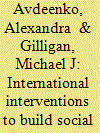

|
|
|
|
|
| Summary/Abstract |
Increasingly the international community attempts to improve local public infrastructure in developing countries by creating more participatory local governance and social capital. We report on a randomized field experiment conducted in 24 communities (16 treated and 8 control) in rural Sudan. We offer a clearer theoretical statement of how these programs might alter the political landscape of the recipient villages. We measure norms using lab-in-the-field techniques and we measure network density with a survey of our 475 lab subjects. We appraise the participatory character of local governance and civic participation with a survey of 576 households. The program did not affect either networks or norms, but civic participation and the participatory nature of local governance increased. Thus we attribute the increase in citizen participation not to social capital growth but to more open local governing institutions.
|
|
|
|
|
|
|
|
|
|
|
|
|
|
|
|
| 7 |
ID:
127463
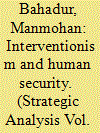

|
|
|
|
|
| Publication |
2014.
|
| Summary/Abstract |
The conflict in Syria is inexorably turning into a quagmire as more entities get dragged into the sludge. From a hands-off policy to one of humanitarian support, the West has progressed to arming rebels, while Russia has shown that it is determined not to let down its ally by continuing arms shipments to the Assad regime. Meanwhile, other actors are chipping in to add to the misery; the latest reports refer to Sudan sending arms to rebels through (and financed by) Qatar.1 As the crisis meanders into its third year, the chant of greater proactiveness from human security proponents is getting louder, reminiscent of international interventions of the past two decades in various parts of the world.
|
|
|
|
|
|
|
|
|
|
|
|
|
|
|
|
| 8 |
ID:
173915
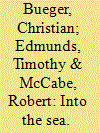

|
|
|
|
|
| Summary/Abstract |
Maritime security capacity-building is a growing field of international activity. It is an area that requires further study, as a field in its own right, but also as an archetype to develop insights for capacity-building and security sector reform in other arenas. This article is one of the first to analyse this field of activity. Our empirical focus is on the Western Indian Ocean (WIO) region. Here, international actors have launched multiple capacity-building projects, initially in response to Somali piracy. We document the significance, extent and variety of capacity-building activities in this region and examine the ways in which capacity-building at sea has incorporated innovative characteristics that develop and expand the capacity-building agenda as traditionally understood. Our conclusion highlights the need to pay more attention to the maritime domain in international security and development studies and considers ways in which the maritime capacity-building experience may offer important lessons for other fields of international policy.
|
|
|
|
|
|
|
|
|
|
|
|
|
|
|
|
| 9 |
ID:
159962
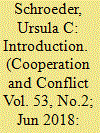

|
|
|
|
|
| Summary/Abstract |
International interventions are an omnipresent and increasingly diverse instrument in world politics. This special issue of Cooperation and Conflict follows broader calls to ‘decentre’ the study of International Relations and seeks to contribute to a research agenda that goes beyond the prevailing focus on Northern actors and interests in interventions research. The special issue advances two interrelated research strategies to decentre the study of international interventions. First, it promotes research that gives voice to the diversity of experiences and perspectives outside the Northern centre. Second, it embraces an emerging set of methodological advances that draw on sociological and ethnographic research traditions in order to advance the in-depth study of interventions. With contributing authors from the fields of peace and conflict studies, regional and area studies, as well as International Relations, the special issue sets out to build bridges across disciplinary boundaries by bringing together a set of experts who normally speak to separate audiences within their respective research fields. Taking research beyond the ‘classical’ cases of intervention, the articles provide in-depth case narratives of intervention practices in the Solomon Islands, Colombia, Somalia, Puntland, Côte d’Ivoire, Lebanon and Jordan.
|
|
|
|
|
|
|
|
|
|
|
|
|
|
|
|
| 10 |
ID:
189272
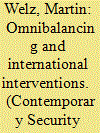

|
|
|
|
|
| Summary/Abstract |
This article studies why authoritarian states participate in international interventions. Troop contributions of such states indicate the support of authoritarian leaders for a liberal-cosmopolitan order that entails the protection of human rights internationally, while they deny such rights to their own citizens. I focus on the decisions of Chad’s long-term president Idriss Déby Itno to take an active stance in various international interventions. The analysis builds on the theory of omnibalancing, which holds that authoritarian leaders balance external and internal threats to ensure their survival. I demonstrate how Déby used troop deployment as part of his omnibalancing strategy. It allowed him to stay in power until his death in 2021 and made Chad’s democratization unlikely. For Déby’s omnibalancing not only quelled the domestic opposition and silenced international critique against the authoritarian rule, but also contributed to the securitization of the state.
|
|
|
|
|
|
|
|
|
|
|
|
|
|
|
|
| 11 |
ID:
172872


|
|
|
|
|
| Summary/Abstract |
The work of international interventions, whether grandiose or commonplace in scale, requires credible, verified information. Nevertheless, in settings of armed conflict that interventions aim to transform, information is more often than not improvised, unofficial, fragmented and based on multiple competing imaginaries. Interventions, therefore, are significantly influenced by rumours: the circulation of information and stories based on uncertain accounts of questionable provenance. Research on international intervention has neglected the place and power of rumour. To address this lacuna, this article examines the impact of rumour on the intervention logics and practices of the United Nations Multilateral Stabilization Mission in Mali (MINUSMA). It argues that rumours evince an epistemological force that generates constitutive effects among different sets of conflict actors in Mali. To address the impacts of rumours, different divisions within the intervention pursue practices of investigation, correction and officialization. Nevertheless, by enacting these practices, political tensions emerge that reveal contradictory intervention logics within MINUSMA, and foster conflictual relations between the intervention and different conflict actors in the country, thereby decreasing how Malians perceive MINUSMA's legitimacy.
|
|
|
|
|
|
|
|
|
|
|
|
|
|
|
|
| 12 |
ID:
085719
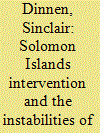

|
|
|
|
|
| Publication |
2008.
|
| Summary/Abstract |
Shortcomings in the prevailing discourse of 'failed states' and the practical challenges of international state-building are examined in this article through a detailed case study of the Solomon Islands, a small independent Pacific island country that since mid-2003 has been the subject of a substantial Australian-led regional state-building exercise. The Solomon Islands intervention and the difficulties it has encountered are examined in the larger context of that country's longer history of state-building and the particular challenges posed by its colonial legacies, the nature of its modern political development and the manner of its integration into the global economy
|
|
|
|
|
|
|
|
|
|
|
|
|
|
|
|
| 13 |
ID:
153643
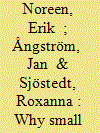

|
|
|
|
|
| Summary/Abstract |
The security behavior of small states has traditionally been explained by different takes of realism, liberalism, or constructivism – focusing on the behavior that aims toward safeguarding sovereignty or engaging in peace policies. The issue of why states with limited military capacities and little or no military alignments or engagements decide to participate in an international mission has received limited attention by previous research. In contrast, this article argues that a three-layered discursive model can make the choices of small states more precisely explained and thereby contribute to an increased understanding of small states’ security behavior beyond threat balancing and interdependence. Analyzing a deviant case of a non-aligned small state, this article explains why Sweden became increasingly involved in the North Atlantic Treaty Organization (NATO)-led International Security Assistance Force (ISAF) mission in Afghanistan. By focusing on the domestic political discourses regarding the Swedish involvement in this mission, it is suggested that a narrative shapes public perception of a particular policy and establishes interpretative dominance of how a particular event should be understood. This dominant domestic discourse makes a certain international behavior possible and even impossible to alter once established. In the Swedish case, it is demonstrated that this discourse assumed a ‘catch-all’ ambition, satisfying both domestic and international demands. In general terms, it should thus be emphasized that certain discourses and narratives are required in order to make it possible for a country to participate in a mission such as ISAF and prolong the mission for several years.
|
|
|
|
|
|
|
|
|
|
|
|
|
|
|
|
|
|
|
|
|